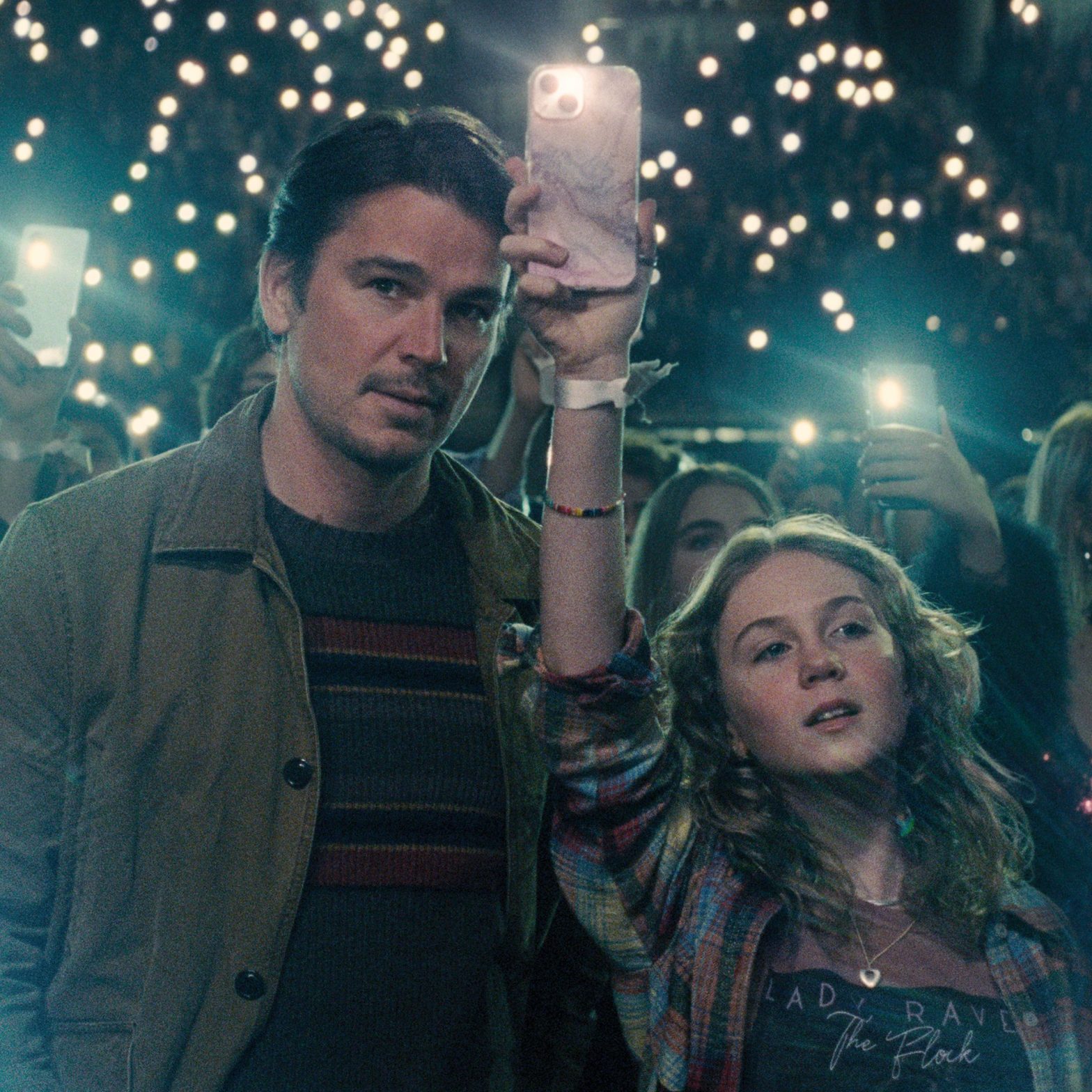:format(webp)/cdn.vox-cdn.com/uploads/chorus_asset/file/25556753/rev_1_TRP_T2_0023r_High_Res_JPEG.jpeg)
Trap’s premise sounded tailor-made to play into M. Night Shyamalan’s twisty strengths and maybe even say something about the modern era of superstars turning their concerts into cinematic events. But for all of its promise, the thriller almost immediately runs out of steam. Shyamalan’s latest is a convoluted misfire whose handful of interesting ideas isn’t nearly enough to keep it from feeling like a notable low point in the director’s filmography.
In its first act, Trap introduces mild-mannered father Cooper Adams (Josh Hartnett) and his daughter Riley (Ariel Donoghue) as the pair make their way downtown to see superstar Lady Raven (Saleka Shyamalan) perform in concert. Though Cooper himself doesn’t quite get the singer’s appeal, she’s everything to his daughter. And with Riley dealing with some friend drama at school, Cooper’s all too happy to take her mind off things with a few hours of live music.
Almost everyone who meets the Adamses sees them as just another father-daughter duo hyped up to see the show. Cooper has a secret, though — he’s a serial killer who has his next victim trapped in a dungeon. You can feel the influence of series killer dramas like You and Dexter in the way Trap juxtaposes moments of familial banality with shots of Cooper sneaking furtive, twitchy glances at his phone to watch a livestream of the man he plans to murder next. But the Shyamalan twist of it all comes early on as Trap establishes how the Lady Raven concert is actually an elaborate ploy to smoke Cooper out.
Trap takes inspiration from Operation Flagship, the 1985 sting operation in which US marshals and DC police lured wanted criminals to the Washington Convention Center with the promise of free football tickets. Shyamalan riffs on that real history to imagine how a Taylor Swift-like concert filled with thousands of screaming teens could be weaponized against a monster. But as Trap works through that thought exercise, the movie is quickly boxed in by its core conceit.
Part of the problem is how Trap stretches credulity even for a Shyamalan movie as Cooper uses his constant “trips to the merch table” to learn more about how the police plan to catch him. The cops are pulling men out of the audience, and they aren’t letting people leave without being interviewed. But none of those dangers ever feel especially pressing for Cooper because of how effortlessly he’s able to skirt by them thanks to the plot armor Shyamalan piles onto him out of necessity.
You’re meant to read the strangeness of Cooper’s behavior as a part of his sociopathy, repeatedly slipping away from his daughter on the concert floor. Cooper has to slip away in order for the movie to really move. Otherwise, things would come to an end rather abruptly. But Trap becomes harder and harder to take seriously as Cooper’s situation pushes him to take a series of increasingly absurd — but not exactly exciting — chances on ploys to evade capture.
There’s an absurdity to the way Cooper is able to navigate Trap’s game of cat and mouse that almost feels like Shyamalan is trying to say something about what kind of people are seen as threats to society. As Cooper, Hartnett’s utterly devoid of charisma, and there’s an awkwardness to his interactions with Riley that doesn’t entirely feel intentional. But he’s a handsome white guy, and that seems to be enough to keep people from clocking his overt weirdness.
:format(webp)/cdn.vox-cdn.com/uploads/chorus_asset/file/25557432/rev_1_TRP_T1_0029r_High_Res_JPEG.jpeg)
If fewer of Cooper’s tricks to escape — which serve as the film’s set pieces — came by way of convenient happenstance, Trap might work a bit better as a straight thriller about a predator becoming prey. But the movie goes to such absurd lengths to keep its story going that it definitely feels like Shyamalan ran out of solid ideas early on.
Everything about Trap, from its story to the way it also works as a vehicle for his daughter’s career as a musician, makes it feel like exactly the kind of project you might expect from Shyamalan, who has often self-financed his films since 2015. The director himself cameos as Lady Raven’s uncle and becomes part of the story in a way that connects him to Cooper’s search for an exit. But Shyamalan’s presence in the film is somewhat distracting and has a way of drawing attention to how many of Trap’s characters speak to the camera with a cloyingness the director tends to be very fond of.
Conceptually, this is one of Shyamalan’s most intriguing films, but its foundation is so limiting that it winds up feeling like the director set a trap for himself. It’s a testament to his ability to come up with novel ideas — but that alone isn’t always enough to make for a good time at the movies.
